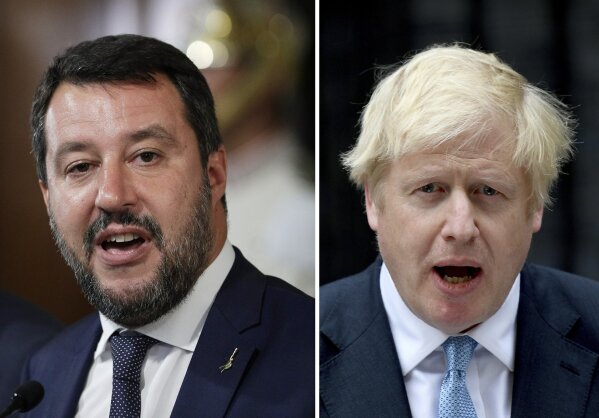Johnson and Salvini: 2 soaring stars lose big political bets
ROME (AP) — Who would have bet that two soaring stars of European politics would have gambled so badly on strategic power plays?
Both British Prime Minister Boris Johnson and Italian right-wing politician Matteo Salvini found themselves in corners this week, each in his own way having lost bets that their popularity would carry the day.
Instead, analysts and fellow politicians say, both men badly miscalculated the crucial role of democratic institutions like parliament in the age of populist politics and underestimated the time-tested tactic of bitter enemies ganging up together in countermoves.
“They confused their popularity with power, and they thought because of their popularity they would be able to ram through their plans,” said Wolfango Piccoli, an analyst and co-president of Teneo intelligence, based in London.
The circumstances for each leader in these waning weeks of summer are decidedly different.
In London, the unpredictable Johnson is still in power, although his gambit to sideline Parliament in his iron-clad determination to ensure Britain exits the European Union on Oct. 31 backfired. Over in Rome, while trying to trigger early elections so he could become premier, firebrand Salvini lost his two powerful coalition posts, as virulently anti-migrant interior minister and as deputy premier in Italy’s first all-populist government.
In Johnson’s case, faced by a feisty Parliament, where he enjoyed only the slimmest of working majorities, he took a gamble in late August. The prime minister declared that Parliament would be suspended for weeks in the crucial run-up to the Brexit deadline. But Johnson’s strategy only ended up uniting lawmakers, with the rebels including 21 lawmakers from his own Conservative Party. His move cost him his working majority and left his Brexit strategy in tatters.
One of the lawmakers who was suspended from the Conservative group in Parliament this week after voting against Johnson’s government blamed the prime minister’s mistake on hiring as key advisers those who ran the successful “leave” campaign in the 2016 referendum on EU membership. But those advisers have scant experience in working with Parliament.
“Just maybe they thought they could win over Parliament and they can succeed if they ran things like a campaign,” lawmaker Alistair Burt said. “You can’t. It’s a misjudgment.”
Salvini was riding high, after his nationalist League party triumphed in European Parliament elections in May. Advisers pressed him to pull his League from Premier Giuseppe Conte’s then barely year-old coalition, confident the Italian president would dissolve Parliament and set elections this fall.
Instead, Salvini spent much of the summer basking in his own glory, working crowds of adoring vacationers at seaside resorts. Back in Rome, in trattorie and party backrooms, his political rivals, the opposition Democrats and the League’s ill-matched coalition partner, the 5-Star Movement, were strategizing to keep him from power.
“If you are on the beach, getting mojitos and selfies left and right, and everyone’s thanking you for stopping the invasion of Africans, you feel you’re some kind of Superman who can do anything,” said Franco Pavoncello, professor of political history and president of John Cabot University in Rome. The reference to Africans reflects the contention by Salvini, and much of his voter base, that migrants cause crime and rob work from Italians.
During his “wild, two-week vacation,” Salvini “lost touch with reality to some extent, political reality,” said John Harper, a history professor at Johns Hopkins School of Advanced International Studies in Bologna.
When Salvini did make his move, yanking his party from Conte’s coalition, it proved to be too late. The 5-Stars, co-founded by caustic comic Beppe Grillo, and the Democrats, whose powerbrokers include wily former Premier Matteo Renzi, then cut a deal.
Blindsided, Salvini seemed shocked that Conte on Wednesday formed his second government, again with the 5-Stars but this time with the Democrats while the League is banished to Parliament’s opposition ranks. Until nearly the end, Salvini desperately lobbied the 5-Stars to again govern with his League.
“It would have been hard for him to have believed that Renzi and Grillo, bitter enemies, would get together and turn out to be more Machiavellian and more ruthless than anyone expected,” Harper said.
Used to getting his way, Salvini cried foul. But President Sergio Mattarella reminded the nation that in a parliamentary democracy what matters is whether a coalition commands a working majority in the legislature.
Still, “I’m not sure it is the role of Parliament itself that they didn’t take into account,” Harper said. “In both cases, they seemed to underestimate the capacity of their opponents to thwart them and to unite.”
Johnson at times has used populist tactics, such as claiming that out-of-touch politicians are trying to defy the will of the people on Brexit. He is known for surprises and still may win a national election if one is held.
“By Christmas, things can be looking good for him, he could be looking like a strategic genius,” Harper said. But Salvini “has definitely lost this round,” with the new coalition motivated to banish the specter of early elections.
Ultimately, said the London-based Piccoli, “you can do very well in opinion polls, but there are rules, there are institutions that need to be taken into consideration.”
___
Gregory Katz, Jeffrey Schaeffer and Jill Lawless in London contributed to this report.





